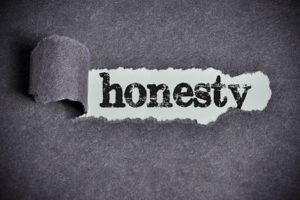|
|
 I can remember being in one of my undergrad advertising classes and the professor told us about a recent study that measured the trustworthiness or honesty of various professions. Keep in mind, this was 30+ years ago but I can still see the slides he used to show us the results. The least trusted professional was the car salesman, he revealed. Following the car salesman were members of Congress and then he paused for effect and with a click, there was the slide that besmirched the career we’d all chosen — advertising professionals.
I can remember being in one of my undergrad advertising classes and the professor told us about a recent study that measured the trustworthiness or honesty of various professions. Keep in mind, this was 30+ years ago but I can still see the slides he used to show us the results. The least trusted professional was the car salesman, he revealed. Following the car salesman were members of Congress and then he paused for effect and with a click, there was the slide that besmirched the career we’d all chosen — advertising professionals.
Ouch.
Out of curiosity, I googled the topic today and guess what — in Gallup’s 2012 poll, the bottom three were the same. (Apparently, nurses have topped the list ever since the profession was included in the annual poll, except for 2001 when firefighters got the nod right after 9/11.)
Sadly, what those three professions have in common is that people believe that they’re not always truthful. No one wants to be taken advantage of or fooled and that’s the stereotype these professions have to fight against. The upside is that people can behave themselves out of these stereotypes. We all know honest car dealers, politicians and as marketers – we can change the perception of our profession too.
Whether you work inside a company and are responsible for its marketing, or work at an agency, or own your own business – there is hope. You can actually be the one they trust and look to for honesty.
As marketing messages got more and more prevalent, the average ad/marketing effort seemed to get louder. Everything was hyperbole and bigger, better or bolder. No wonder it created fatigue and mistrust. It’s not possible for everything to be perfect for everyone.
But your marketing can break through all of that and be something different. It can be honest and still be effective. In fact, follow these best practices and you’ll be amazed at how effective.
Use real language: When you’re writing copy – be it a tweet or for a 5-minute video, be mindful of the words you choose. Make sure you sound like the people you’re talking to. Make sure there aren’t any communication barriers that get in between you and your audience. Remember that consumers are hypersensitive to boasting and spin, so be very frugal with words that exaggerate, hype or promise too much.
Don’t try to be a round hole for someone’s square peg: You can’t possibly be the right solution for everyone, so admit that. Help your prospective customer find the best fit – even if it’s not you. While they may not put money in your pocket – I promise you, someone they know will because they’ll have heard about how you put the prospect’s best interests ahead of your own.
Don’t sugar coat the truth: This isn’t easy but it’s vital. Everyone can tell someone what they want to hear. Very few will tell them what they need to hear. As a marketing professional, you can differentiate yourself by kindly but firmly speaking the truth. By doing that, you can actually begin to look for a solution. If they can’t count on us to tell them the truth, what can they count on us for?
Help, don’t sell: Create helpful marketing that educates and elevates your audience. Don’t shout at them — teach them. People are intelligent – they’ll figure out for themselves if they should do business with you. Let them see who you are, what you know and how you can help them.
Want to break the stereotype and be a marketer characterized by honesty? Don’t exaggerate, talk like a regular human being, don’t chase everyone with a dollar in their pocket, tell the truth and be helpful.
That doesn’t sound so tough, does it?
